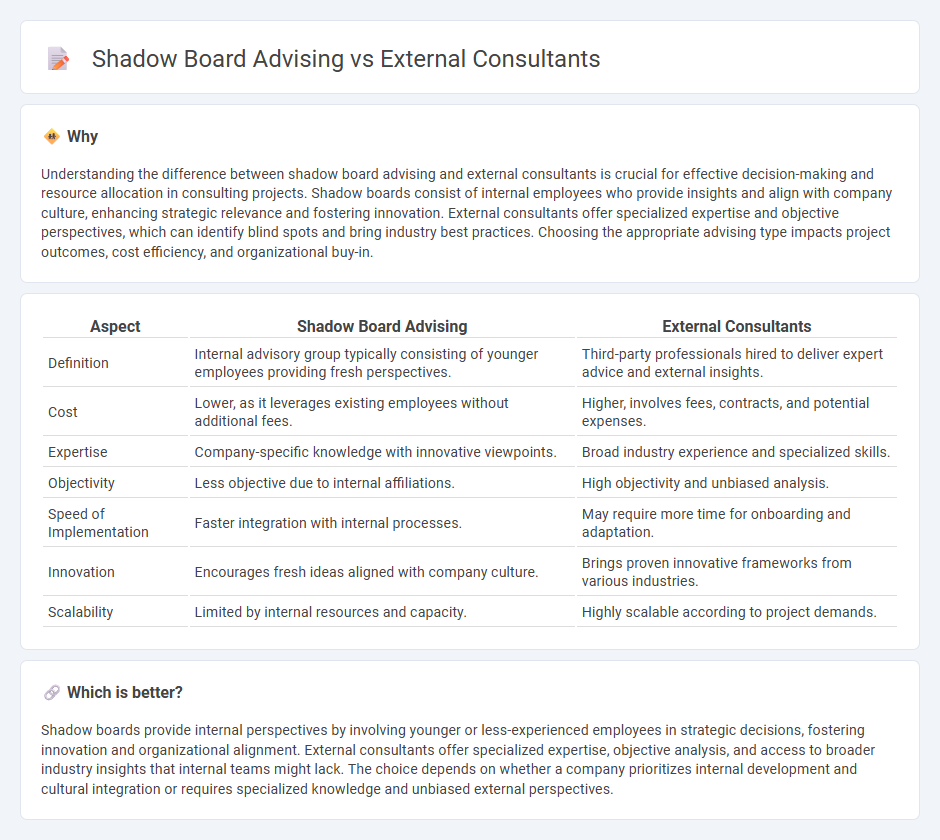
Shadow boards leverage internal employees to provide insight and advice, fostering innovation and aligning closely with company culture for strategic decision-making. External consultants bring specialized expertise and objective perspectives, offering focused solutions based on industry best practices and extensive experience. Discover the unique benefits and strategic applications of both advisory approaches to enhance your organization's growth.
Why it is important
Understanding the difference between shadow board advising and external consultants is crucial for effective decision-making and resource allocation in consulting projects. Shadow boards consist of internal employees who provide insights and align with company culture, enhancing strategic relevance and fostering innovation. External consultants offer specialized expertise and objective perspectives, which can identify blind spots and bring industry best practices. Choosing the appropriate advising type impacts project outcomes, cost efficiency, and organizational buy-in.
Comparison Table
| Aspect | Shadow Board Advising | External Consultants |
|---|---|---|
| Definition | Internal advisory group typically consisting of younger employees providing fresh perspectives. | Third-party professionals hired to deliver expert advice and external insights. |
| Cost | Lower, as it leverages existing employees without additional fees. | Higher, involves fees, contracts, and potential expenses. |
| Expertise | Company-specific knowledge with innovative viewpoints. | Broad industry experience and specialized skills. |
| Objectivity | Less objective due to internal affiliations. | High objectivity and unbiased analysis. |
| Speed of Implementation | Faster integration with internal processes. | May require more time for onboarding and adaptation. |
| Innovation | Encourages fresh ideas aligned with company culture. | Brings proven innovative frameworks from various industries. |
| Scalability | Limited by internal resources and capacity. | Highly scalable according to project demands. |
Which is better?
Shadow boards provide internal perspectives by involving younger or less-experienced employees in strategic decisions, fostering innovation and organizational alignment. External consultants offer specialized expertise, objective analysis, and access to broader industry insights that internal teams might lack. The choice depends on whether a company prioritizes internal development and cultural integration or requires specialized knowledge and unbiased external perspectives.
Connection
Shadow board advising enhances organizational insight by incorporating diverse perspectives from emerging leaders, fostering innovation and strategic agility. External consultants bring specialized expertise and an objective viewpoint, complementing the shadow board's internal insights to drive informed decision-making. Together, shadow boards and external consultants create a dynamic advisory ecosystem that accelerates business transformation and competitive advantage.
Key Terms
Objectivity
External consultants provide unbiased insights drawn from diverse industry experiences, ensuring objective evaluations during strategic decision-making. Shadow boards, composed of internal emerging leaders, offer fresh perspectives while aligning closely with company culture and operational realities. Explore how combining both approaches can enhance organizational objectivity and innovation.
Institutional Knowledge
External consultants offer specialized expertise but often lack deep institutional knowledge, which can limit their ability to provide context-specific insights. Shadow boards consist of internal employees who possess intimate understanding of the organization's culture and operations, enhancing decision-making with practical experience. Explore the advantages of integrating shadow boards to leverage institutional knowledge more effectively.
Change Management
External consultants bring specialized expertise and an unbiased perspective to change management initiatives, often accelerating project timelines through proven methodologies and best practices. Shadow boards, composed of internal employees who simulate advisory roles, offer real-time organizational insights and foster internal engagement, enhancing the adaptability and acceptance of change. Explore the distinct impact of each approach on transforming your organization effectively.
Source and External Links
Internal Vs. External Consultants --Which Path Leads To Success? - External consultants bring a fresh, unbiased perspective and specialized expertise from diverse industries, making them crucial for innovative solutions and complex transformation projects, while internal consultants provide long-term strategy embedded within the organization.
8 advantages of hiring external consultants over internal consultants - External consultants offer unique insights from working with multiple clients, an objective viewpoint free from internal politics, and can facilitate conflict resolution more effectively than internal staff.
Why The External Consultant Model Works - ProsperSpark - The external consultant model is effective because consultants provide unbiased recommendations, bring expert experience focused on specific projects, and demonstrate a company's commitment to change by investing in outside help.
 dowidth.com
dowidth.com